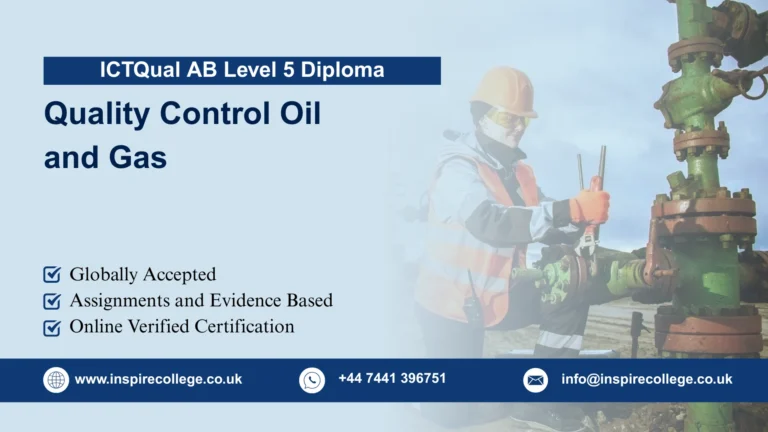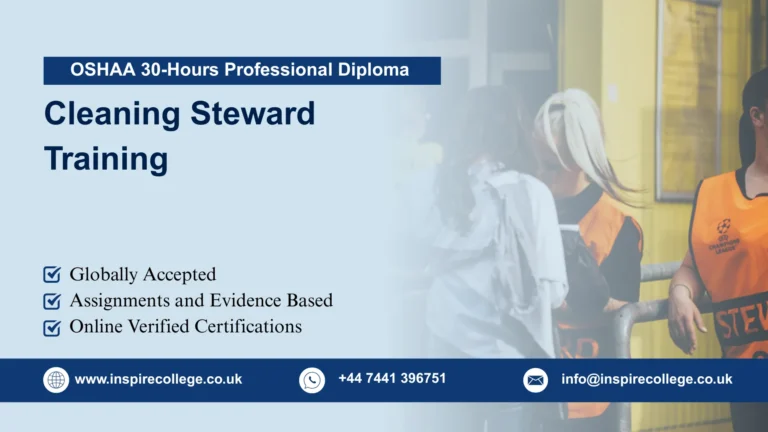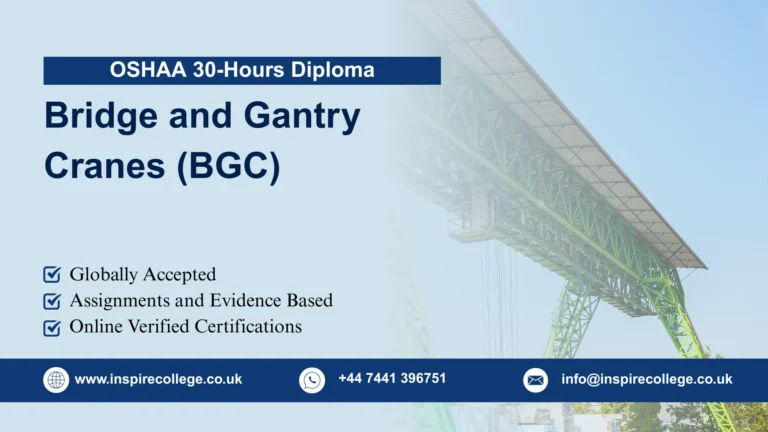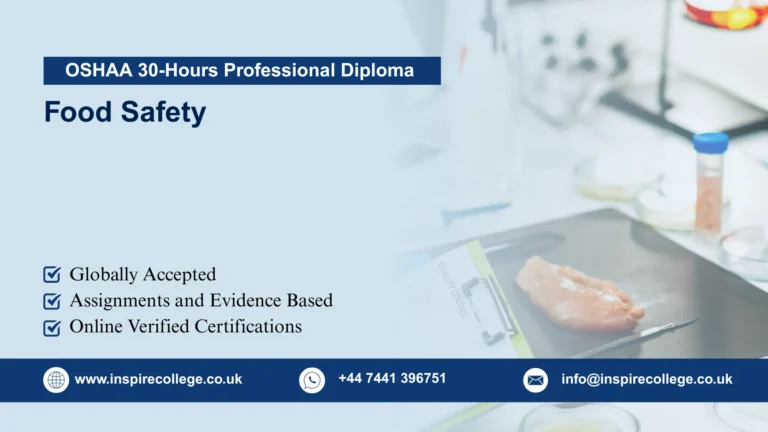
OSHAA 30-Hours Professional Diploma in Quality Assurance / Quality Control (QA/QC) and Piping Engineering
In the industrial, oil and gas, and construction sectors, the integrity, reliability, and safety of piping systems are critical to operational efficiency, risk management, and regulatory compliance. The OSHAA 30-Hours Professional Diploma in Quality Assurance / Quality Control (QA/QC) and Piping Engineering is designed to equip professionals with the technical knowledge, practical skills, and industry-standard inspection techniques needed to uphold the highest quality standards in piping engineering projects.
OSHAA 30-Hours Professional Diploma in Quality Assurance / Quality Control (QA/QC) and Piping Engineering covers the full spectrum of QA/QC practices, including material selection, welding procedures, fabrication and installation techniques, inspection methodologies, non-destructive testing (NDT), defect detection, adherence to international codes and standards (ASME, API, ISO), and proper reporting protocols. Learners will gain hands-on experience in evaluating piping systems, conducting inspections, identifying and addressing non-conformities, and implementing corrective and preventive measures in line with global industrial standards.
By completing the OSHAA 30-Hours Professional Diploma in Quality Assurance / Quality Control (QA/QC) and Piping Engineering, participants will gain advanced technical expertise and practical skills essential for modern industrial projects. Learners will develop the ability to accurately interpret engineering drawings, evaluate piping and welding layouts, and identify potential defects or non-conformities in systems. They will also learn to manage and maintain comprehensive quality documentation, including Welding Procedure Specifications (WPS), Procedure Qualification Records (PQR), and Non-Destructive Testing (NDT) reports, ensuring full traceability and compliance with international standards.
The OSHAA 30-Hours Professional Diploma in QA/QC and Piping Engineering is designed for QA/QC engineers, piping inspectors, project engineers, site supervisors, and other industrial professionals who are committed to advancing their technical expertise and career prospects. This program provides a comprehensive understanding of piping systems, welding technology, inspection methods, non-destructive testing (NDT), defect identification, and adherence to international codes and standards such as ASME, API, and ISO.
To ensure participants are fully prepared to benefit from the OSHAA 30-Hours Professional Diploma in QA/QC and Piping Engineering, applicants should meet the following criteria:
- Age Requirement
- Applicants must be at least 18 years old at the time of enrollment.
- Ensures participants have the maturity required for professional-level industrial training.
- Educational Requirements
- Minimum of a high school diploma or equivalent qualification.
- Candidates with prior education in mechanical engineering, metallurgy, welding technology, or piping engineering are preferred.
- Additional certifications in quality assurance, inspection, or industrial processes are advantageous.
- Professional Experience
- Prior experience in QA/QC, welding, piping systems, fabrication, or construction is recommended but not mandatory.
- Ideal for QA/QC engineers, piping inspectors, project engineers, site supervisors, and industrial professionals responsible for maintaining quality and compliance.
- Technical Skills
- Basic understanding of piping systems, welding processes, and industrial inspection techniques.
- Familiarity with engineering drawings, welding procedure specifications (WPS), procedure qualification records (PQR), and quality documentation is beneficial.
- Competence in using inspection tools and non-destructive testing (NDT) techniques is advantageous.
- Motivation and Commitment
- Learners must demonstrate a strong interest in QA/QC practices, piping engineering, and industrial inspection.
- Commitment to completing 30 hours of structured learning, including both theoretical and practical exercises, is essential.
- Dedication to professional growth and adherence to workplace safety standards is expected.
- English Language Proficiency
- Good command of written and spoken English is required to understand technical documentation, international standards, and workplace communication.
Mandatory Units
The OSHAA 30-Hours Professional Diploma in Quality Assurance / Quality Control (QA/QC) and Piping Engineering, to achieve the qualification candidates must complete all the mandatory units form the following :
Mandatory Units
- Fundamentals of QA/QC in Piping Engineering
- Piping Materials, Components, and Manufacturing Processes
- Welding Technology and Procedure Qualification
- International Codes and Standards: ASME, API, ISO
- Non-Destructive Testing (NDT): Methods and Applications
- Interpretation of Piping Isometrics and Layout Drawings
- Inspection and Test Plans (ITPs) in QA/QC Projects
- Identification and Evaluation of Piping Defects
- Quality Documentation: WPS, PQR, NDT Reports, and Records
The OSHAA 30-Hours Professional Diploma in Quality Assurance / Quality Control (QA/QC) and Piping Engineering is designed to equip learners with advanced knowledge, technical skills, and practical competence necessary to ensure the highest standards of quality, safety, and compliance in piping engineering projects. Participants will gain the expertise to perform inspections, implement QA/QC procedures, identify defects, and maintain documentation aligned with international industry standards.
1. Fundamentals of QA/QC in Piping Engineering
- Understand the principles of Quality Assurance (QA) and Quality Control (QC) in piping projects.
- Recognize the roles and responsibilities of QA/QC professionals in industrial settings.
- Explain the importance of QA/QC practices in maintaining safety, reliability, and regulatory compliance.
- Develop the ability to apply QA/QC concepts in real-world piping engineering scenarios.
2. Piping Materials, Components, and Manufacturing Processes
- Identify common piping materials and components, including their properties and applications.
- Understand fabrication and assembly processes in industrial piping systems.
- Evaluate the suitability of materials and components for specific industrial applications.
- Ensure compliance of manufactured piping components with project specifications.
3. Welding Technology and Procedure Qualification
- Gain knowledge of welding processes, techniques, and equipment.
- Understand Welding Procedure Specifications (WPS) and Procedure Qualification Records (PQR).
- Analyze welding procedure qualifications for adherence to codes and standards.
- Apply practical skills to assess weld quality and compliance during inspections.
4. International Codes and Standards: ASME, API, ISO
- Interpret key international standards applicable to piping and welding inspection.
- Apply ASME, API, and ISO codes in QA/QC processes and inspection activities.
- Ensure compliance with global regulatory frameworks and client requirements.
- Integrate code requirements into practical QA/QC inspections and reporting.
5. Non-Destructive Testing (NDT): Methods and Applications
- Understand NDT methods such as ultrasonic, radiographic, magnetic particle, and dye penetrant testing.
- Apply NDT techniques to detect defects in welding and piping systems.
- Evaluate NDT results to ensure compliance with quality standards.
- Implement safety and operational best practices for on-site NDT procedures.
6. Interpretation of Piping Isometrics and Layout Drawings
- Read and interpret piping isometric drawings, schematics, and layout diagrams.
- Understand symbols, dimensions, and annotations used in piping documentation.
- Apply drawing interpretation to inspection planning and execution.
- Verify material, fabrication, and installation compliance using engineering drawings.
7. Inspection and Test Plans (ITPs) in QA/QC Projects
- Develop and implement Inspection and Test Plans (ITPs) for piping and welding projects.
- Apply project-specific QA/QC procedures to maintain compliance and control.
- Monitor project progress and conduct inspections at critical stages.
- Coordinate with project teams to resolve non-conformities effectively.
8. Identification and Evaluation of Piping Defects
- Conduct visual and technical inspections to detect piping and welding defects.
- Identify common defects such as cracks, porosity, undercuts, and misalignments.
- Recommend corrective actions and preventive measures to ensure system integrity.
- Document and report findings in line with QA/QC protocols.
9. Quality Documentation: WPS, PQR, NDT Reports, and Records
- Maintain accurate documentation for Welding Procedure Specifications (WPS), Procedure Qualification Records (PQR), and NDT reports.
- Record inspection findings, corrective actions, and quality logs systematically.
- Ensure traceability, accountability, and compliance during audits and inspections.
- Support continuous improvement in QA/QC practices through proper documentation.
The OSHAA 30-Hours Professional Diploma in Quality Assurance / Quality Control (QA/QC) and Piping Engineering is designed for professionals who want to advance their expertise in industrial QA/QC, piping, and welding inspection. This program is suitable for learners aiming to strengthen technical skills, practical competence, and professional knowledge in line with international standards.
The ideal learner for this program includes:
- QA/QC engineers and supervisors responsible for maintaining quality and compliance in piping and welding projects.
- Welding inspectors and site inspectors involved in fabrication, installation, and maintenance of industrial piping systems.
- Project engineers, construction supervisors, and site managers overseeing QA/QC protocols, inspection procedures, and compliance standards.
- Professionals working in industries such as oil and gas, petrochemical, power generation, construction, and manufacturing.
- Graduates and professionals from mechanical engineering, metallurgy, welding technology, or related technical fields who wish to specialize in QA/QC and piping engineering.
- Individuals seeking hands-on knowledge of welding procedures, material testing, defect detection, non-destructive testing (NDT), and interpretation of engineering drawings.
- Learners aiming to understand international codes and standards (ASME, API, ISO) and apply them in real-world industrial projects.
- Professionals committed to Continuous Professional Development (CPD) and career growth in quality assurance, inspection, and industrial safety.
- Individuals motivated to enhance operational safety, improve reliability, and ensure compliance in piping and welding projects.
- Learners interested in acquiring practical skills for developing Inspection and Test Plans (ITPs), maintaining quality documentation (WPS, PQR, NDT reports), and implementing corrective measures.
By completing OSHAA 30-Hours Professional Diploma in Quality Assurance / Quality Control (QA/QC) and Piping Engineering, learners will gain the expertise, confidence, and practical competence to conduct inspections, ensure QA/QC compliance, and contribute effectively to the successful delivery of high-quality, safe, and reliable piping projects across global industries.
Register Now
OSHAA 30-Hours Professional Diploma in Quality Assurance / Quality Control (QA/QC) and Piping Engineering






